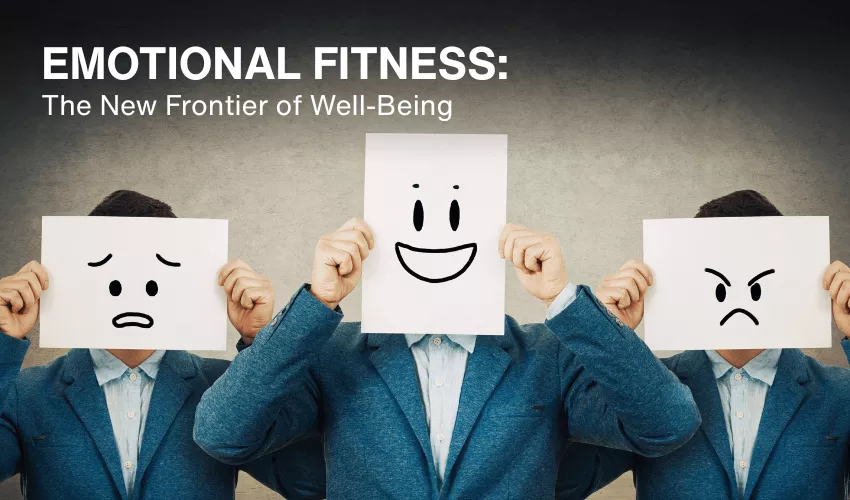
“Sir, I’m Tired… But It’s Not Physical.”
That’s what a senior manager once told me during a leadership coaching session. A high
performer, admired by his peers, always hitting targets. From the outside, he was in
control.
But behind the scenes? He was running on empty.
But behind the scenes? He was running on empty.
He wasn’t tired because of the long hours. He was tired because of everything else,
constant pressure, unprocessed stress, emotional firefighting, and not enough time to
breathe. What he lacked wasn’t productivity. It was emotional fitness.
But behind the scenes? He was running on empty.
That’s when I realized: in today’s world, we urgently need to train not just our minds
and bodies, but our emotions too.
What Is Emotional Fitness And Why It’s Important
We all understand the value of physical fitness. Go to the gym, eat healthy, take your
vitamins. But what about emotional stamina? The ability to bounce back from a tough
conversation, stay calm when things go sideways, or handle conflict without being drained?
That’s emotional fitness.
It’s not about suppressing emotions. It’s about managing them intelligently, consistently,
and sustainably. And just like your physical body, your emotional health needs daily
maintenance. Not once a year at a retreat. Not just when you crash. But every day, like a
muscle.
Emotional Well-Being: Not Just the Absence of Stress
Many people think emotional well-being means "feeling good all the time." It doesn’t. It
means staying grounded even when things go wrong.
I once worked with a senior leader, seasoned CEO, during a high-stakes strategy session
where everything seemed to be going off track. The team was tense. Deadlines were slipping.
Emotions were flaring.
But in the middle of the storm, the CEO quietly stepped back. He poured himself a cup of
tea, looked out the window for a moment, and then calmly returned to the table, steady,
focused, and composed.
Later, when I asked him how he managed to stay so grounded, he simply said,
“If I panic, everyone else will. Calmness doesn’t solve the problem instantly,but it
gives you the clarity to respond better.”
That stayed with me.Because that’s emotional fitness, not the absence of pressure, but the
ability to hold your center when things are spinning around you. And more often than not,
that quiet steadiness influences the room more than any urgent reaction ever could.
It reminded me that emotional well-being isn’t about controlling what’s outside, it’s about
mastering what’s within.
Emotional Wellness Tips That Actually Work
Over the years, I’ve experimented with many practices, for myself, my teams, and my clients.
The ones that truly support emotional health are always the simplest:
Morning check-ins: Ask yourself, “How do I feel today?” Name the feeling.
Respond, don’t react: When triggered, pause for 10 seconds. (You’ll thank yourself
later.)
Quiet resets: 10–15 minutes of stillness every evening: no phone, no tasks. Just
be.
Joy breaks: Do one small thing daily that lifts you emotionally: a walk, music,
laughter.
These emotional wellness tips may sound small, but they’re powerful. Like compound interest,
they grow over time and so does your emotional resilience.
Mental and Emotional Health Go Hand in Hand
It’s hard to separate the mind from the heart. Your mental and emotional health are deeply
connected.Unchecked emotions lead to poor focus, anxiety, burnout, and even physical
illness. That’s why companies are now investing not just in skill-building, but in emotional
development too.
And personally? The best leaders I’ve met aren’t the loudest or the smartest, they’re the
ones who stay centered when chaos erupts.They listen when others panic. They reflect instead
of react.
And it’s not because they were born with some superpower.
It’s because they worked on their emotional fitness deliberately.
Emotional Fitness Is Leadership Fitness
In my leadership programs, I always remind people:
What you don’t process emotionally, you’ll project externally.
That’s why the inner game matters.
If you want to be a better parent, leader, coach, partner, or friend, start with emotional
clarity.
It’s not soft. It’s strategic.
Because without emotional health, success feels hollow. And without emotional well-being,
even your best days can feel heavy.
Final Reflection: Stronger on the Inside
The world today is noisy, unpredictable, and often overwhelming. But your ability to stay grounded, emotionally and mentally will be your anchor.
So don’t wait for a breakdown to build strength.
Start today.
Ask yourself:
- What’s one emotion I’ve been avoiding?
- What helps me reset when I feel drained?
- How can I take care of my mental and emotional health proactively—not reactively?
Because at the end of the day, emotional fitness isn’t about perfection. It’s about presence. Awareness. And choosing inner strength, one small moment at a time.





